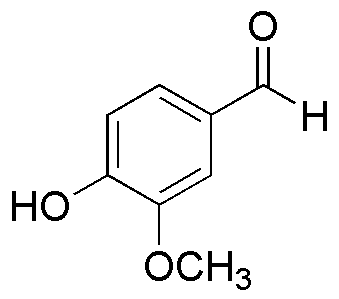Vanillin ex Clove is widely utilized in research focused on:
- Flavoring Agent: Commonly used in the food industry, it enhances the flavor of various products like baked goods, chocolates, and beverages, providing a natural alternative to synthetic flavorings.
- Fragrance Industry: Employed in perfumes and scented products, it adds a sweet, warm aroma, making it a popular choice for personal care items and home fragrances.
- Pharmaceutical Applications: Utilized in the formulation of medications, it can improve taste and mask unpleasant flavors, making medicines more palatable for patients.
- Antioxidant Properties: Research indicates its potential as a natural antioxidant, which can be beneficial in food preservation and cosmetic formulations, helping to extend shelf life and maintain product integrity.
- Research and Development: Used in laboratories for synthesizing other compounds, it serves as a building block in organic chemistry, aiding in the development of new materials and pharmaceuticals.
Informations générales
Propriétés
Sécurité et réglementation
Applications
Vanillin ex Clove is widely utilized in research focused on:
- Flavoring Agent: Commonly used in the food industry, it enhances the flavor of various products like baked goods, chocolates, and beverages, providing a natural alternative to synthetic flavorings.
- Fragrance Industry: Employed in perfumes and scented products, it adds a sweet, warm aroma, making it a popular choice for personal care items and home fragrances.
- Pharmaceutical Applications: Utilized in the formulation of medications, it can improve taste and mask unpleasant flavors, making medicines more palatable for patients.
- Antioxidant Properties: Research indicates its potential as a natural antioxidant, which can be beneficial in food preservation and cosmetic formulations, helping to extend shelf life and maintain product integrity.
- Research and Development: Used in laboratories for synthesizing other compounds, it serves as a building block in organic chemistry, aiding in the development of new materials and pharmaceuticals.
Documents
Fiches de données de sécurité (FDS)
La FDS fournit des informations de sécurité complètes sur la manipulation, le stockage et l’élimination du produit.
Spécifications du produit (PS)
Le PS fournit une description complète des propriétés du produit, notamment sa composition chimique, son état physique, sa pureté et les exigences de stockage. Il détaille également les plages de qualité acceptables et les applications prévues du produit.
Certificats d'analyse (COA)
Recherchez des certificats d'analyse (COA) en saisissant le numéro de lot du produit. Les numéros de lot et de lot se trouvent sur l'étiquette d'un produit, après les mots « Lot » ou « Lot de fabrication ».
Numéro de catalogue
Numéro de lot/série
Certificats d'origine (COO)
Ce certificat d'exploitation confirme le pays dans lequel le produit a été fabriqué, et détaille également les matériaux et composants utilisés et s'il est issu de sources naturelles, synthétiques ou autres sources spécifiques. Ce certificat peut être requis pour les douanes, le commerce et la conformité réglementaire.
Numéro de catalogue
Numéro de lot/série
Fiches de données de sécurité (FDS)
La FDS fournit des informations de sécurité complètes sur la manipulation, le stockage et l’élimination du produit.
DownloadSpécifications du produit (PS)
Le PS fournit une description complète des propriétés du produit, notamment sa composition chimique, son état physique, sa pureté et les exigences de stockage. Il détaille également les plages de qualité acceptables et les applications prévues du produit.
DownloadCertificats d'analyse (COA)
Recherchez des certificats d'analyse (COA) en saisissant le numéro de lot du produit. Les numéros de lot et de lot se trouvent sur l'étiquette d'un produit, après les mots « Lot » ou « Lot de fabrication ».
Numéro de catalogue
Numéro de lot/série
Certificats d'origine (COO)
Ce certificat d'exploitation confirme le pays dans lequel le produit a été fabriqué, et détaille également les matériaux et composants utilisés et s'il est issu de sources naturelles, synthétiques ou autres sources spécifiques. Ce certificat peut être requis pour les douanes, le commerce et la conformité réglementaire.


